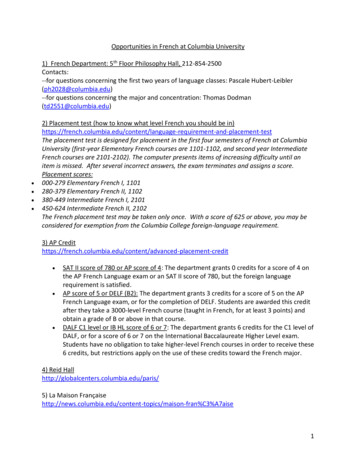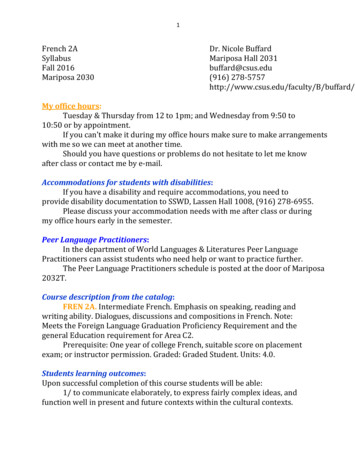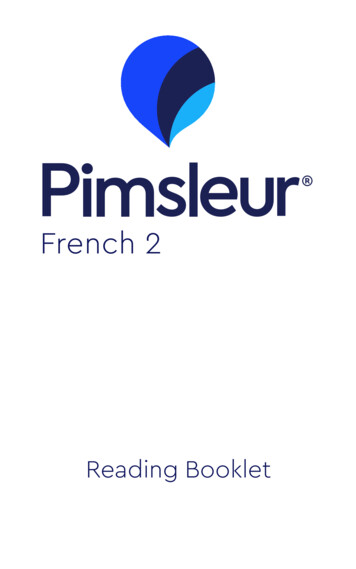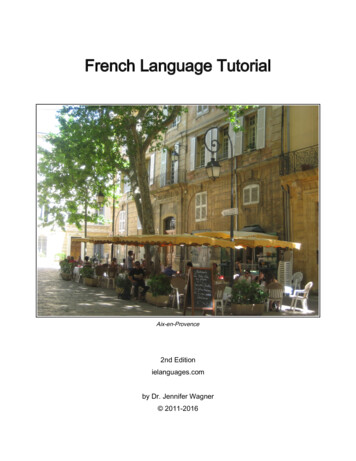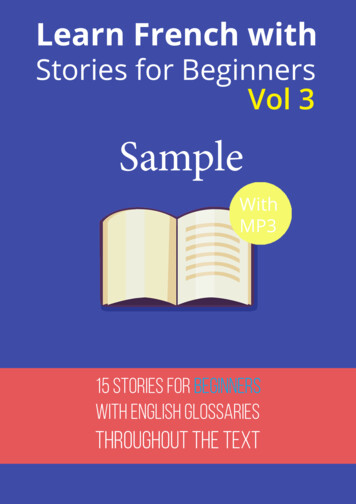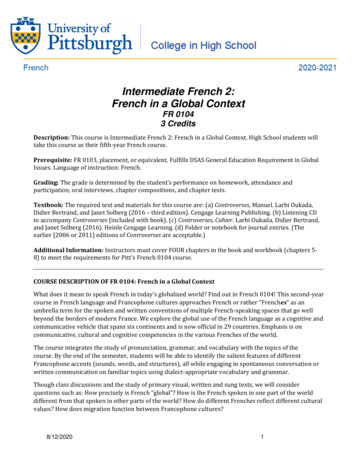
Transcription
DELF A1 SyllabusThis DELF A1 Syllabus contains an overview of what a student is expected to know at the A1 level.After completing the DELF A1 level course, you should be able to accomplish the following:Greet peopleTalk about yourselfTalk about where you liveTalk about your family membersTalk about your likes and dislikesEngage in a simple buy-and-sell situationAsk about the day, the time and the dateAccept and refuseRead simple notices, posters and cataloguesFill in a simple formDELF A1 SyllabusWrite a simple postcardCopyright FRENCH FASTER. All rights reserved.page 1/5
DELF A1 Vocabulary Topics1. Alphabet1. L'alphabet2. Numbers2. Les nombres3. Family name & Given Name3. Les noms et prénoms4. Residence4. L’adresse5. Personal items5. Les objets personnels6. Classroom objects6. Les objets de la classe7. Nationalities7. Les nationalités8. Professions8. Les professions9. Marital status (married / single)9. L’état civile (marié / célibataire)10. Countries & Cities10. Les pays & les villes11. Hobbies11. Les loisirs12. Family12. La famille proche13. Time13. L'heure14. Prices14. Les prix15. Weather / Climate15. La météo / le climat16. Date16. La date17. Days of the week17. Les jours de la semaine18. Descriptions (small, big, old, young, etc)18. Les descriptions (petit, grand, vieux, jeune, etc)19. Colours19. Les couleurs20. Seasons20. Les saisons21. Places21. Les lieuxCopyright FRENCH FASTER. All rights reserved.page 2/5DELF A1 SyllabusBased on the DELF A1 Syllabus, here's a list of DELF A1 Vocabulary Topics that you are expected to know.
DELF A1 Grammar Topics1. Personal subject pronouns1. Les pronoms personnels sujets2. Tonic pronouns2. Les pronoms toniques3. Present tense - State, Description3. Le présent – l’état, la description4. Common verbs: be, have, do, to be called4. Quelques verbes usuels: être, avoir, faire, s’appeler5. ER Verbs: to live, to work, to talk5. Quelques verbes à une base (-er) : habiter, travailler, parler6. Verb: to understand (I and You forms)6. Le verbe comprendre (je, vous)7. Condionnal for politeness (I would like to)7. Le conditionnel de politesse «je voudrais»8. Interrogation (the 3 forms)8. La phrase interrogative simple : les trois formes9. Interrogative words: Do you, What do you9. Les formes interrogatives : est-ce que, qu’est-ce que10. Interrogative pronouns: Where, When, How much10. Quelques pronoms interrogatifs : où, quand, combien11. Interrogative adjectives (what)11. Les adjectifs interrogatifs (quel)12. It is / This is / Here is12. Les présentateurs (c’est, voilà)13. Definite and Indefinite articles13. Les articles définis, les articles indéfinis14. Zero article for professions14. L’article «zéro» : être profession15. Cardinal numbers15. Les nombres cardinaux16. Demonstrative adjectives16. Les adjectifs démonstratifs17. Masculine/Feminine & Singular/Plural17. L’accord masculin/féminin ; singulier/pluriel18. Agreement of Adjectives (for nationalities)18. L’accord des adjectifs (de nationalité)19. Some descriptive adjectives (big, small, .)19. Quelques adjectifs qualificatifs (grand, petit, .)20. Position of adjectives20. La place des adjectifs21. Affirmative and Negative sentences21. Les phrases affirmatives et négatives22. Negation (not)22. La phrase négative : ne.pas23. Possesive 's to show belonging23. Le complément du nom avec «de» - l’appartenance24. Possessive adjectives24. Les adjectifs possessifs25. Partitive articles (of the)25. Les articles partitifs (du, de la, .)26. Adverbs of quantity (a few, a lot)26. Quelques adverbes de quantité (un peu, beaucoup)27. Uncountable27. La quantité indeterminée (du, de la, des)28. Countable28. La quantité déterminée (un peu de, beaucoup de, pas de)29. Impersonal 'it' for the weather29. La forme impersonelle simple : «il» pour la météo30. Expressions of time (now, this morning, tomorow)30. La localisation temporelle : quelques adverbes detemps (maintenant, ce matin, demain.)31. Expressions of time (days, months, seasons, year)32. Expressions of Place: go to / come from a cityor country; live in a city or country33. There is / There are34. Connectors: and, or, but31. L’expression du moment: prépositions date, mois,saison, année32. La localisation spatiale : venir de / aller à ville ou pays- habiter à, au, en ville ou pays33. Il y a34. Quelques articulateurs du discours : et, ou, alorsCopyright FRENCH FASTER. All rights reserved.page 3/5DELF A1 SyllabusBased on the DELF A1 Syllabus, here's a list of DELF A1 Grammar Topics that you are expected to know.
DELF A1 Speaking TopicsBased on the DELF A1 Syllabus, here's a list of DELF A1 Speaking Topics that you are expected to know.1. Entrer en contact avec qn:saluer qnprendre congédemander/donner des nouvelles à qn2. IntroductionTell about yourself or sb elseGive your nameSpell your nameTell your ageTell your nationalityTell your profession2. Présenter qn:donner son identité ou l’identité de qndonner son nomépéler son nomdire son âgedire sa nationalitédire sa profession3. Talk about your daily lifeGive your address/emailGive your phone numberTalk about your familyTalk about your hobbies3. Parler de son environnement quotidiendonner son adresse/son e-maildonner son numéro de téléphoneparler de sa familleparler de ses loisirs4. Describe an object / a personTell apart sth or sbSay the price of an objectTalk about ownershipTalk about quantityDescribe the weather4. Décrire un objet/une personnedésigner qch ou qndire le prix d’un objetexprimer l’appartenanceexprimer la quantitédire le temps qu’il fait5. Ask for an informationAsk for personal informationAsk about the dateAsk about the timeAsk about a service5. Demander une informationposer des questions personellesdemander la datedemander l’heuredemander un service6. Talk about when something happensTell the dateTell the time6. Situer des événements dans le tempsdire la datedire l’heure7. Talk about where something happensGive directions about a city / a country7. Se situer dans l’espace : situer un lieulocaliser une ville/un pays8. Give instructions or advice8. Donner des instructions/des indications9. Accept something: Agree to sth9. Accepter qch : répondre par l’affirmative10. Refuse something: Disagree10. Refuser qch : répondre par la négative11. Participate in a conversationSay what you don't understand11. Participer à une conversationdire qu’on ne comprend pasCopyright FRENCH FASTER. All rights reserved.DELF A1 Syllabus1. First encountersGreet sbTake leave of sbAsk sb's news or Give your newspage 4/5
DELF A1 Sociocultural knowledgeBased on the DELF A1 Syllabus, you should be aware of the following sociocultural issues at DELF A1 level.1. Les salutations (lors d’une rencontre)2. Simple expressions to express politeness:excuse me, please, sorry, thank you2. Les formules de politesse simples:excusez-moi, s’il vous plaît, pardon, merci3. Informal you and Formal you3. Tu ou Vous4. Difference between I want & I woud like4. La distinction Je veux et Je voudrais5. How to write an informal letter5. Les rituels de la lettre amicale6. How to write a postcard6. Les rituels de la carte postale7. How to write an email7. Les rituels de l’e-mailDELF A1 Syllabus1. Greetings (when meeting people)Copyright FRENCH FASTER. All rights reserved.page 5/5
Content and Topics for Grammar and Vocabulary. In English and French. 2019, 2020, 2021. PDF Download. Keywords: delf a1 syllabus, delf a1 syllabus pdf, delf a1 syllabus pdf download, delf a1 syllabus pdf download free, delf a1 topics, delf a1 content, delf a1 syllabus 2019, delf a1 syllabus 2020, delf a1 syllabus 2021, delf a1 syllabus download
